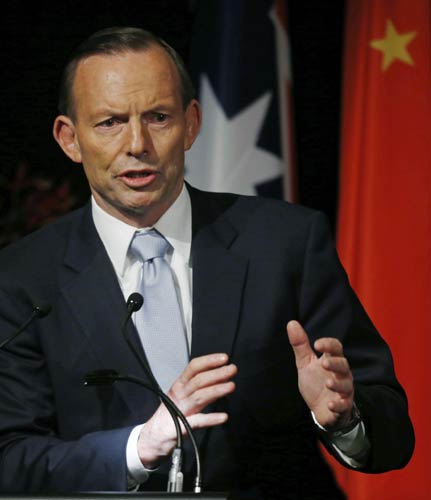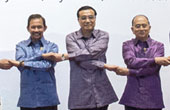Australia out of step with new climate momentum
(Agencies) Updated: 2014-11-28 15:24
 |
|
Australia's Prime Minister Tony Abbott addresses the Australia-China state and provincial leaders forum, also attended by China's President Xi Jinping, in Sydney November 19, 2014. [Photo/Agencies] |
CANBERRA - Australian Prime Minister Tony Abbott, who rose to power in large part by opposing a tax on greenhouse gas emissions, is finding his country isolated like never before on climate change as the US, China and other nations signal new momentum for action.
Abbott tried and failed to keep the issue off the agenda of the annual G20 summit of wealthy and emerging countries that was hosted by the Australian city of Brisbane in mid-November. An agreement between Washington and Beijing to curb emissions, announced days before the summit, suggests he had misjudged the international mood on the issue.
Next week, attention turns to the next round of international climate change negotiations in Lima, Peru. For a nation of just 23 million, Australia has played a significant role in past talks, but this time it's unclear what kind of role its delegation, led by Foreign Minister Julie Bishop, will play.
Abbott's conservative coalition won a landslide election victory last year over the Labor Party, which had grown unpopular in part because it had approved one of the world's highest taxes on major carbon gas polluters. Abbott not only ended that tax but years earlier helped scuttle an effort by his own Liberal Party to reach a bipartisan deal on a carbon-trading scheme, intended to encourage industries to produce less emissions.
G20 heavyweights including the United States and Europe steamrolled Australia's efforts as summit host to keep climate change off the agenda in Brisbane. In the end, the G20 agreed to work together toward a global agreement on reducing carbon gas emissions at a major U.N. climate change conference in Paris in September 2015. The Lima meeting is the final high-level ministerial summit in which countries will aim to work toward a draft agreement to be presented in Paris.
A European Union official described getting Australia to agree to the wording of a paragraph on climate change in the G20 summit communique as slow-moving "trench warfare." In arguing for keeping climate change off the G20 agenda, Australia said it was not strictly an economic issue and would distract from goals including a plan to boost global GDP by more than $2 trillion over five years.
President Barack Obama miffed some in Abbott's administration when he said that among Asia-Pacific nations, "nobody has more at stake when it comes to thinking about and then acting on climate change" than Australia.
"Here in Australia it means longer droughts, more wildfires. The incredible natural glory of the Great Barrier Reef is threatened," he said.
Bishop said she was "surprised" by Obama's speech and later wrote to him, outlining Australian measures to protect the World Heritage-listed coral reef and assuring its preservation for generations to come. The Labor opposition described the government's response to the speech as petulant.
Obama also used his speech in Brisbane to pledge $3 billion to the Green Climate Fund, a UN initiative set up to support developing nations dealing with rising seas, higher temperatures and extreme weather events.
A previous Australian Labor Party government played a leading role in establishing the fund, which has received close to $10 billion in pledges from more than 20 countries. Australia has not offered money to the fund, though it says some of its foreign aid budget is spent on climate change mitigation.
Swedish Climate Ambassador Anna Lindstedt, who will be part of her country's delegation in Lima, said Australia's reluctance to contribute to the fund has created a "negative dynamic" in negotiations with large developing countries including China, who ask why they should be expected to contribute when Australia, one of the richest countries per capita, won't.
"Their climate negotiators are still doing a very good job and trying to be as constructive as possible, but it is a challenge under the current circumstances," Lindstedt said. "Some emerging economies are in some ways more progressive than Australia."
- Xi's Australia visit significant success: expert
- China calls on US, Canada, Australia to jointly combat corruption
- Australia working on new drift modelling for MH370 wreckage
- Australia abuzz over bee threat
- Dim Sum bonds gaining popularity in Australia
- Chinese industries influenced by Sino-Australia FTA
- Australia takes 'sugar off table' to stem asylum tide










